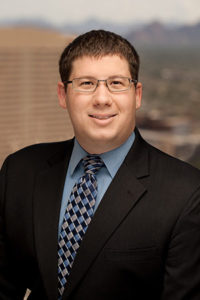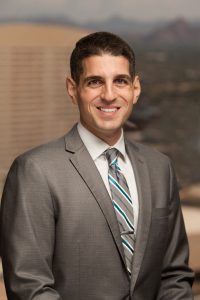
 Avitia v. Crisis Prevention and Recovery Inc.
Avitia v. Crisis Prevention and Recovery Inc.
Arizona Supreme Court
October 16th, 2023
JSH Attorneys: Justin Ackerman & Arcangelo Cella
Arizona Revised Statutes § 13-3620(A) provides that a healthcare provider “who reasonably believes that a minor is or has been the victim of physical injury, abuse, child abuse, a reportable offense or neglect,” who forms this belief “in the course of treating a patient,” “shall immediately report… this information to a peace officer.” The Arizona Supreme Court held that this statutory reporting requirement did not apply in cases where a healthcare provider has reason to suspect future abuse but was unaware of any past or present abuse. In addition, the Court held that a healthcare provider does not owe a common law duty to report potential harm to third parties simply based on general foreseeability.
The case arose from the treatment of a mother with a long history of mental health issues by mental health professionals at Crisis Preparation and Recovery, Inc. (“Crisis Prep”). The mother was hospitalized multiple times over a span of months. On one such occasion, the mother’s family informed a counselor at Crisis Prep that they were afraid to leave the mother alone with her twins, and she was hospitalized as a danger to herself and others. Several months later, and following another hospitalization, the mother drowned the twins.
The father of the twins sued the state, Maricopa County, Crisis Prep, and numerous healthcare providers. The father asserted that Crisis Prep had a statutory duty to report abuse or neglect of the twins and had not done so. He also claimed that Crisis Prep breached a common law duty to protect the twins. The Superior Court entered summary judgment in favor of Crisis Prep on all claims. The court determined that Crisis Prep did not have a duty to report under the circumstances. As part of its holding, the superior court relied on the father’s deposition testimony that, whenever he picked the twins up from the home where the mother lived with her mother and stepfather, they were always happy and smiling. He also stated that he never saw signs of neglect and believed that the grandparents provided a stable environment for them.
The Court of Appeals affirmed, holding that: (1) Crisis Prep had no statutory duty to report under § 13-3620(A) because there was no evidence of past or present abuse or neglect, and (2) controlling precedent, including Gipson v. Kasey, 214 Ariz. 141 (2007) and Quiroz v. ALCOA Inc., 243 Ariz. 560 (2018), forbade expanding the duty of healthcare providers based on the foreseeability of potential victims.
The Arizona Supreme Court granted review and affirmed the decisions of the Court of Appeals and Superior Court. The Court began by observing, without deciding, that it was unclear whether § 13-3620(A) applied because Crisis Prep was simply evaluating, not treating, the mother and because “the statutory context suggests that the duty to report chiefly applies when a minor patient who is being treated is abused or neglected.” In any event, regarding § 13-3620(A), the Court held that because the father presented no evidence that neglect or abuse occurred in the past or occurred during the period when the mother was seen at Crisis Prep there was no duty to report under the statute. The statute, the Court stated, should not be read to require providers to report based only on the potential for future abuse or neglect.
The Court also held that the common law duty of a mental healthcare provider to report danger to a patient’s potential victim exists only where a patient has made an explicit threat of serious physical harm to a clearly identified or identifiable victim. The Court made clear, however, that the duty does not extend to victims that are merely foreseeable. The Court relied on its decisions in Gipson and Quiroz for the proposition that foreseeability of the victim is not a factor in determining whether a duty exists, and that the existence of a duty depends solely on the presence of a special relationship. Because a healthcare provider has a relationship only with their patient and not with foreseeable victims, there is no duty to report potential harm based on foreseeability alone.
On this basis, the Supreme Court affirmed the trial court’s grant of summary judgment.
In a partial concurrence and partial dissent, Justice Timmer asserted that a duty to foreseeable victims arose not from considerations of foreseeability, but from the relationship of the provider to the patient itself. The majority rejected this analysis, reasoning that, even where a special relationship exists, Gipson and Quiroz prevent extending the scope of the associated duty based on foreseeability.
Justin Ackerman represents clients in federal and state appellate matters in cases involving excessive force, wrongful death, personal injury, bad faith, and premises liability. After graduating as the valedictorian of his class from Phoenix School of Law, Justin worked as a law clerk for the Hon. Michael J. Brown in Division One of the Arizona Court of Appeals. Following his clerkship, Justin has handled over 75 appeals, successfully arguing before the Arizona Court of Appeals, Arizona Supreme Court, and U.S. Court of Appeals for the Ninth Circuit. Justin has spoken at many seminars on appellate preservation topics and is recognized as a Southwest Super Lawyers Rising Star and Best Lawyers Ones to Watch in the area of Appellate Practice. He currently serves as the Chair of the Appellate Group at JSH.
jackerman@jshfirm.com | 602.263.4552 | jshfirm.com/jackerman
Arcangelo S. Cella brings a wealth of experience to Jones, Skelton & Hochuli’s appellate group. Arcangelo works closely with JSH trial attorneys to assist with critical motions, and provides guidance from the pleading stage through the trial and post-trial stages in state and federal courts. Arcangelo’s practice includes insurance defense and bad faith, medical and legal malpractice, civil rights, governmental liability, product liability, school law, and wrongful death and personal injury.
acella@jshfirm.com | 602.263.4456 | jshfirm.com/arcangelo-s-cella